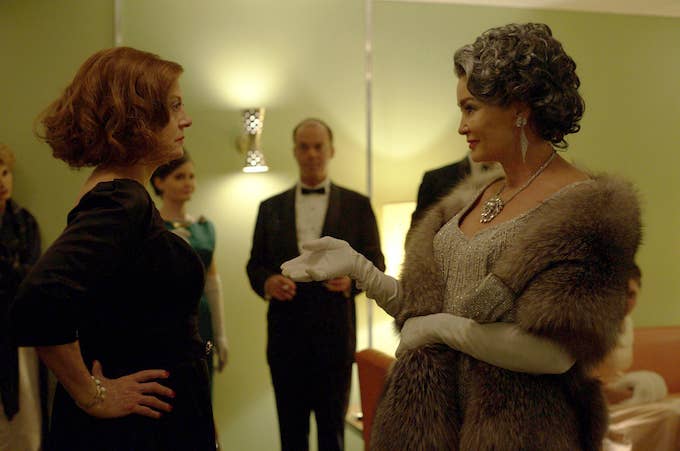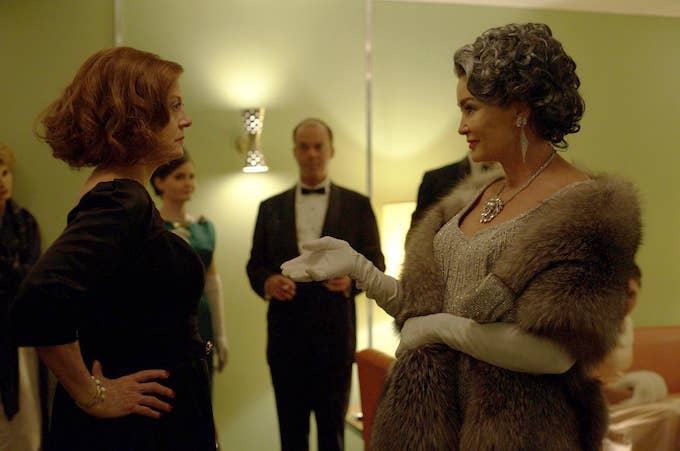
Ryan Murphy’s latest star-studded event series, Feud, begins this Sunday on FX. But before the majority of the viewing public gets to see a single episode of the diva-off between Bette Davis (Susan Sarandon) and Joan Crawford (Jessica Lange), they already know the subject of Feud’s second season: Princess Diana and Prince Charles. In “prenewing” (or pre-renewing) Feud and revealing its next dysfunctional duo, Murphy and FX have the perfect final piece of promotion for a series that is still four days away.
The Feud news follows on the heels of Matthew Broderick and Annette Bening's casting in season two of American Crime Story (about Hurricane Katrina) and the unfortunate announcement that season seven of American Horror Story will focus on the 2016 presidential election. In just the last few weeks alone, Murphy has unveiled big—and provocative—pieces of information about all three of his major franchises (sorry, Scream Queens). Each disclosure has predictably inspired a range of responses that only Murphy can produce, from the excited fantasy casting to nihilistic “yeah, that makes sense.”
Yet, what Murphy understands better than anyone else in television is that the particulars of the response don’t matter. In the exhausting Peak TV era—Netflix is releasing one new show for every paragraph of this here take—Murphy’s shows consistently break through the clutter. It’s not because they’re good. It’s because unlike most TV producers, who work season-to-season (or even episode-to-episode) to survive, Murphy has developed a style of planning, universe-building, and rumor-mongering seen more commonly in film. He’s more Marvel Cinematic Universe than NBC.
There are obvious reasons to do anthology event series under continuing banner titles. As Murphy has said before, the strategy has enabled him to secure the interest of big-name actors who might be unwilling to commit to 100 episodes across five years. It also allows a writer/director/producer with his particular skillset—creative and provocative but also seemingly easily distracted—to experiment, take risks, and ultimately try again. If a season’s theme doesn’t work, oh well, there’s a brand new one coming next year. This is the mission statement for American Horror Story.
Importantly, Murphy’s approach taps into the speculative hype that drives how we talk talk about pop culture online. We all know that approximately 43 percent of all non-porn Internet traffic comes from fans and bloggers fantasy casting the next product in a big franchise. One in every three tweets is about a set report, casting side, trailer Easter Egg, or toy line leak. While most of this “information” is meaningless, and can pretty regularly take away from the enjoyment of an actual film or TV series, it’s fun to talk about projects when they’re still unknown, full of limitless potential, or both.
The biggest film franchises figured this out ages ago. Studios take different approaches to feeding the Internet hype machine. Disney cunningly permits Marvel to be a relatively transparent universe builder while simultaneously lets the mystery drive Star Wars hysteria. But if it’s a major franchise—or even a hopeful franchise—the studio has plotted a 25-point, 18-month plan to keep us interested enough to go to the theater that first weekend.
Historically, TV has been an entirely different beast. While promotion always matters, the shows themselves have been the key way to keep us engaged. It’s simple really; it’s much easier to convince someone to come back next week than it is to ask them to stay connected for two years. But with all the godforsaken shows out there and the insane number of options, generating that constant interest—and more specifically, that constant speculation—matters more and more each TV season.
Ryan Murphy and FX aren’t the only producer-channel pairs that have done this on TV. Star Trek, Twin Peaks, The X-Files, Lost, and most importantly daytime soaps have facilitated a kind of frothing speculation before (even before the web), and both Game of Thrones and The Walking Dead play the game well today. The difference, however, is in scope. All those shows were/are constantly focused on the current or immediately upcoming season, to the point where showrunners for Lost, Thrones, and TWD have flat-out lied to keep people focused on the short-term.
Murphy, meanwhile, is out here playing a much longer game. Every fall during the promo for American Horror Story, there’s Murphy, talking up what he wants to do in the future—whether that’s next season or at some unknown point. He plants those “connections” between every season that keep people locked in on the short- and long-term. The most talked about season of AHS is the all-crossover season, which may or may not happen. Even the promotions for the extra-secretive season six of AHS played like one long troll, referencing all the “hypothetical seasons” Murphy had in his head at one point or another.
It’s the same with American Crime Story and now Feud. The People v. O.J. Simpson was one of the great triumphs of 2016; before it was over, we already knew that Murphy wanted to tackle Katrina. There’s a growing sense that the American Crime Story franchise has already peaked and yet, there’s already three more announced seasons: Katrina, the Gianni Versace murder, and god help us, the Bill Clinton-Monica Lewinsky sex scandal. Given our culture’s ability to produce both great crimes and great feuds, both of these projects could run for another decade. And given Murphy’s heightened, titillating, and sometimes exasperating vision, each season will come with its own round of insane-but-close-to-true casting rumors, Twitter memes (that he’s doing the election for AHS kinda ruins the “American Crime Story: America” jokes we all thought of in November), and plot speculation.
In that way, Ryan Murphy has not just imported strategies from film into TV. He’s become the preeminent content producer—in both his own shows and the mess of stuff it inspires online—of our times. For better or for worse, that’s probably exactly what we deserve in 2017.

